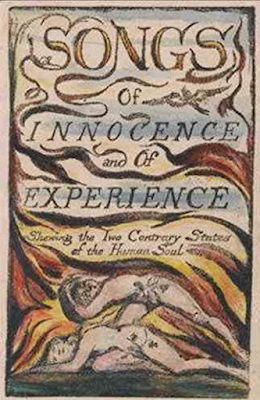The poems in the first section, Songs of Innocence, were about innocence, childlike nature, and childhood; whereas the poems in Experience featured a contrary counterpart, and dealt with authority, rules, or rationality. Blake demonstrated the dual aspect of human nature or nature itself, and sometimes crossed innocence with experience within the poems.
Even the voice of the poems are contrary, so that in Innocence, the poems are narrated through a piper or shepherd -- very dreamy, creative, or carefree, much like a child. Whereas in Experience, the voice is narrated by a Bard or prophet, very authoritative.
In Songs of Innocence, Blake celebrated a child's harmless nature of curiosity, liberty, and pleasure, but emphasised the destructive actions of adults, authority, and society that crush innocence with restrictions, limits, or rules. He also highlighted some of England's cultural practices at the time that threatened childhood, such as child labor.
Songs of Experience involved more direct charges against the Church, parents, and society in general for its mistreatment of children. It seems to me he also used his own personal experiences with these jurisdictions.
Furthermore, in Experience, Blake questioned the Church, God, and religion, too. He had an idealized view of relationships and the world, and he disputed the institution of marriage and romanticized free, uncommitted love. He reminds me exactly of Jean-Jacques Rousseau.
* * *
I am very excited to begin the next poet on TWEM list: William Wordsworth.



No comments:
Post a Comment
Share your thoughts...